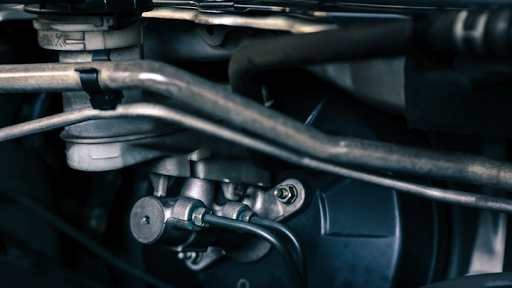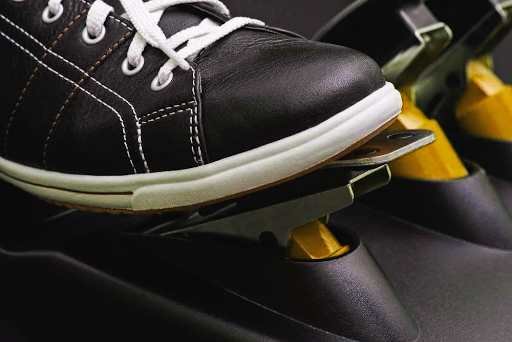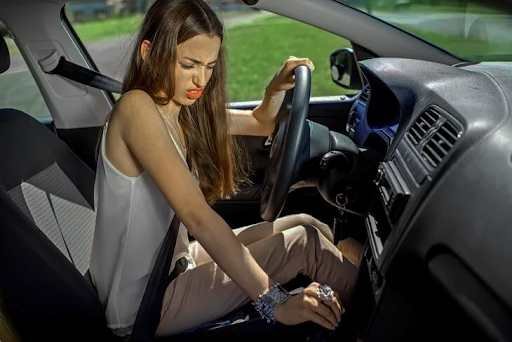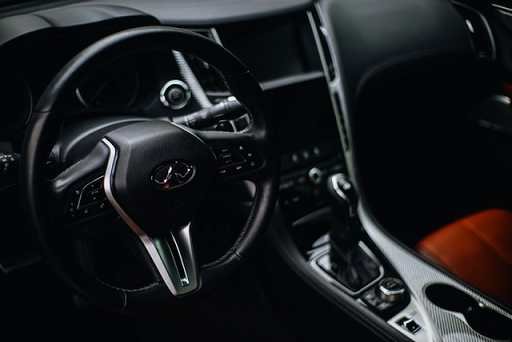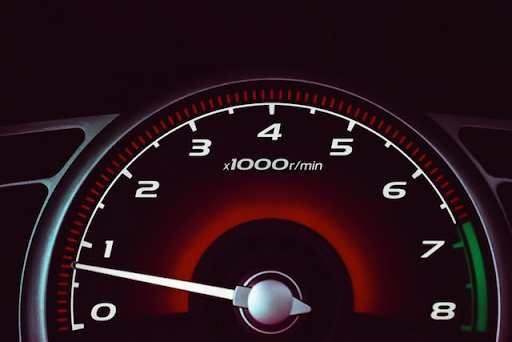Car jerks When Slowing Down
Experiencing a sudden jerking in your car when slowing down can be an alarming and dangerous situation that not only hinders the smooth operation of your vehicle but also poses a potential risk of loss of control on the road.
As an automotive enthusiast with a keen interest in maintaining the top-notch condition of my car, discovering the root cause of this issue was essential. Through a comprehensive exploration, I delved into the common reasons behind this problem and sought practical solutions to address it effectively.
It’s valuable to understand that ensuring a proper and safe resolution involves more than a quick fix; it requires a guide to the underlying problems and their remedies. By adopting this guide, you can sustain your vehicle’s optimal running condition, mitigating the risk and ensuring a safe, smooth journey for everyone on the road.

10 Causes Of Car Jerking When Slowing Down
The following are the main causes of car jerking.
Warped Rotors
Discovering warped rotors in your car can be a pivotal moment, especially when you’re trying to diagnose that perplexing jerking sensation while slowing down. As a fundamental component of the braking system, rotors play a vital role in ensuring your vehicle stops smoothly.
However, when they become warped, it’s a whole different story. This warpage can cause pulsations and vibrations upon applying the brakes, leading directly to the unsettling jerk you feel.
The root cause? It could be attributed to numerous factors such as hard braking, extended periods of high-temperature driving, or uneven wear on your brake pads. A professional inspection is often needed to pinpoint this issue.
Thankfully, replacing these warped rotors can help regain the proper braking performance and eliminate those unnerving jerks.
It’s a clear reminder of how crucial maintaining every component of your vehicle is, for the sake of smooth operation and safety on the road.
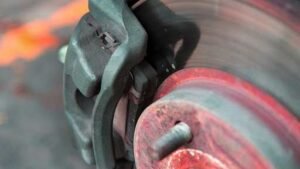
ABS Actuation
Understanding how ABS works can explain why your car might jerk when you slow down. The Antilock Brake System (ABS) is important for stopping the car’s wheels from locking up when you brake hard. But, if it’s not working right, it can cause the car to jerk.
This happens because the ABS quickly pumps the brakes, making the brake pedal feel like it’s pulsing and the car to jerk. Problems could be due to worn-out ABS parts, broken sensors, or issues with the ABS control module. Some repairs might be easy, while others can be more complicated and costly.
Knowing how this part of your car works is crucial for fixing the issue and making your rides smoother and safer.
Compromised Brake Booster
A compromised brake booster can significantly impact your driving experience, especially when it leads to jerking sensations while slowing down. This hydraulic device is designed to assist in applying the brakes, effectively decreasing the amount of force required to depress the brake pedal.
However, when it’s not working correctly, due to issues like a failing check valve, malfunctioning vacuum pump, or a vacuum leak, it can cause a loss of braking performance. Such a compromise often invites jerking sensations as the vehicle decelerates, signaling a need for immediate attention.
Recognizing these signs early and addressing them, whether through simple replacement or repair of the vacuum system, is crucial to eliminate this unsettling experience.
It underscores the importance of applying the right amount of force on the brakes and maintaining the integrity of all brake-related components for smooth and safe driving.
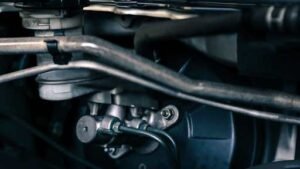
Seized Brake Caliper
A seized brake caliper is a critical issue that often leads to a jerking sensation when your vehicle is slowing down. This occurs when the caliper, which is required to apply the brake pads to the rotor and effectively slow down the car, becomes stuck or seized.
The result is an uneven braking force on the wheels, which can cause a pulsating feel and an unsettling jerking sensation. The reasons behind a seized caliper can range from a lack of lubrication, and corrosion, to the buildup of dust and debris.
This not only leads to heat buildup and drag brakes but also damages the braking system further. To restore the proper braking performance of your car, it’s essential to replace the seized calipers along with any damaged components.
Addressing this issue promptly prevents further damage and ensures a smooth, safe driving experience.
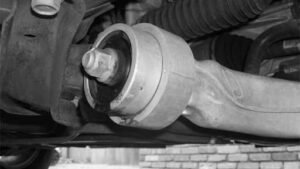
Worn Steering/Suspension Bushings
Worn steering/suspension bushings are often the culprits behind a jerking sensation when your vehicle is slowing down, subtly undermining the control and stability of your ride.
These bushings are responsible for providing a cushioned connection between the moving parts of your steering system and suspension system, ensuring smooth operation. Over time, however, they can wear down, leading to an increased loss of control and stability in your car.
This wear not only causes the steering or suspension to become loose but also results in a bouncing motion, especially noticeable when slowing down. Such conditions not only introduce a jerking sensation but also pose a potential decrease in braking and handling performance.
Transmission Problems
Transmission problems can be a significant factor behind your vehicle experiencing jerking sensations when slowing down. The transmission, responsible for transferring power from the engine to the wheels, is essential for a car’s ability to move smoothly.
When it’s not working correctly, whether due to low fluid levels, worn-out components, or electrical problems, it can cause various issues. Shifting harshly, losing power, or the clutch slipping are common signs of transmission issues that lead to jerky movements. A slipping clutch that doesn’t engage adequately allows the engine to rev without proper acceleration, particularly noticeable when the vehicle is slowing down.
This mismatch in power transfer can result in a jerking motion, making it crucial to address these transmission issues promptly.
Identifying and repairing damaged or worn-out gears can restore the smooth shift and eliminate the discomfort of jerking sensations, ensuring your drive is as smooth as intended.
Faulty MAF Sensor
A faulty MAF (Mass Air Flow) sensor can be a less obvious yet significant cause of jerking sensations in your car when slowing down. This sensor calculates the amount of air that enters the engine and sends a signal to the ECM (Engine Control Module), which then controls the fuel-to-air ratio.
When malfunctioning, the MAF sensor can cause the air-fuel mixture to become lean, leading to a variety of engine performance issues such as rough idling, reduced power, and misfires.
These issues can make the engine run roughly when slowing down, ultimately causing the vehicle to jerk. It may also stall or hesitate to stop, disrupting the smooth flow of driving.
Addressing a faulty MAF sensor promptly can restore proper engine function and eliminate these jerking sensations, ensuring a smoother and more reliable driving experience.
Compromised Ignition Coils
Compromised ignition coils can significantly impact the smooth operation of your engine, leading to jerking sensations as you slow down. These coils are vital for providing the high-voltage spark required to ignite the air-fuel mixture in the engine’s cylinders.
When they’re not functioning appropriately, it can lead to reduced power, rough running, and misfires. Such misfiring not only causes your car to jerk when slowing down but may also struggle to sustain a smooth idle, or even stall or hesitate upon stopping.
The increase in the frequency of these issues indicates a serious problem that needs addressing. To regain the proper performance of your engine and eliminate these unsettling jerking sensations, it’s often necessary to replace the faulty ignition coils along with any other damaged components.
This step ensures your vehicle runs as smoothly and reliably as it was designed to.
Sticking Throttle Body
A sticking throttle body can create a jerking sensation in your vehicle as you’re slowing down, primarily because it’s responsible for controlling the amount of air that enters the engine.
When it becomes stuck, even after releasing the accelerator pedal, the engine continues to receive an excess of air, which leads to a sudden surge of power. This unexpected increase in power results in the car jerking, especially noticeable when you’re attempting to slow down.
The throttle body is connected to the accelerator through the throttle cable, making its smooth operation essential for the vehicle’s performance.
Addressing this issue might require you to clean or replace the throttle body altogether, depending on the severity of the problem.
Ensuring that this component functions correctly is crucial for preventing the jerking motion and maintaining a smooth driving experience.
Vacuum Leaks
Vacuum leaks in a vehicle’s engine system can lead to jerking sensations when slowing down, caused by air entering the engine through unintended pathways.
This issue tends to occur when the integrity of the engine’s vacuum system is compromised, allowing outside air to disrupt the carefully balanced air-fuel mixture.
The result is an engine that runs leaner than it should, as the extra air enters the combustion chamber without a corresponding increase in fuel. This imbalance can cause the engine to misfire or hesitate, especially noticeable when you’re attempting to decelerate, leading to the vehicle jerking.
Identifying and repairing vacuum leaks are crucial for restoring smooth engine performance and preventing the jerking motion that can slow down a harsh experience.
What Should You Do When Your Car Jerks?
When your car jerks while slowing down, it’s crucial to methodically check and inspect various components to diagnose and address the issue.
Initially, for those with a manual car, examining your gear shifting technique is advisable; poor shifting or wrong downshifting can often be the culprit.
Additionally, don’t overlook the brakes—air in brake lines or worn brake pads are common problems that necessitate a service. If the jerking persists, turning your attention to the transmission is necessary; although repairing it can be complex, fixing this critical component cannot be delayed.
Furthermore, the anti-lock brake system (ABS) could be responsible, especially if the ABS warning indicator is on. Above all, stay calm and continue driving safely to a mechanic’s workshop.
If the safety of the vehicle be compromised, pull over and look for roadside assistance. Taking these steps ensures you address the problem effectively, maintaining your car’s performance and safety on the road.
How to Fix Car Jerks When Braking?
To mitigate the jerking experienced when braking, a comprehensive approach targeting several key components of your car is necessary.
- Begin with replacing worn brake pads and resurface or replace warped brake rotors to ensure even and smooth braking.
- Inspect and repair or replace faulty brake calipers that may hinder the braking system’s efficiency.
- Flush and replace contaminated or old brake fluid to maintain optimal hydraulic pressure.
- Address suspension problems and replace worn shock absorbers/struts to improve vehicle stability during braking.
- Ensure proper tire maintenance and alignment for uniform tire wear and better handling.
- Diagnose and repair ABS issues that could affect braking dynamics. Replace damaged wheel bearings to eliminate any wobbling or vibrations.
- Don’t overlook engine problems or misfires and check for transmission problems, performing the necessary repairs.
- Each step eliminates the jerking sensation and ensures a smoother stop.
FAQs
How Do I Fix My Car from Jerking?
Understanding ABS helps explain why your car jerks when you brake. If ABS malfunctions, it pumps the brakes quickly, causing the car to jerk. Issues could be from worn parts or faulty sensors, and fixing them can vary in complexity and cost.
Can Low Oil Cause Jerking?
Yes, low oil levels can cause jerking in a car by affecting the engine’s lubrication, leading to increased friction among moving parts which can result in uneven power delivery and jerking motions.
Is Jerking a Transmission Problem?
Yes, jerking can be a sign of a transmission problem, particularly if it occurs during gear shifts or when accelerating, indicating issues such as low transmission fluid, a faulty transmission control module, or worn gears.
Also read: Why is smoke coming out of car vents?
Also read: That Refuses to Move in Drive
Also read: Won’t Stay Running Without Pressure on the Gas Pedal?
Final Word
In conclusion, addressing a car’s jerking motion requires a systematic approach to diagnose and fix potential issues ranging from transmission problems, and low oil levels, to fuel and air system discrepancies. Regular maintenance and timely repairs are crucial for ensuring smooth vehicle operation and preventing further damage. Consulting with a professional mechanic is recommended for a thorough examination and appropriate solution to maintain your car’s performance and safety on the road.
